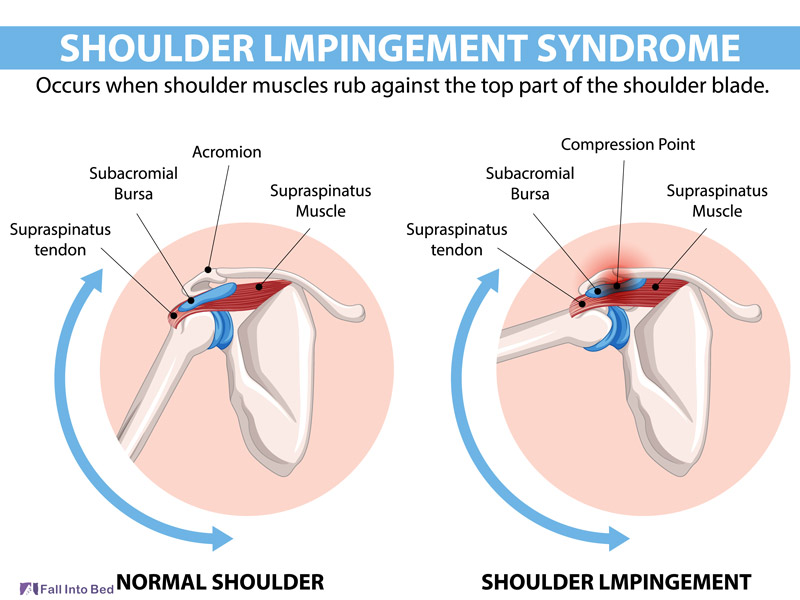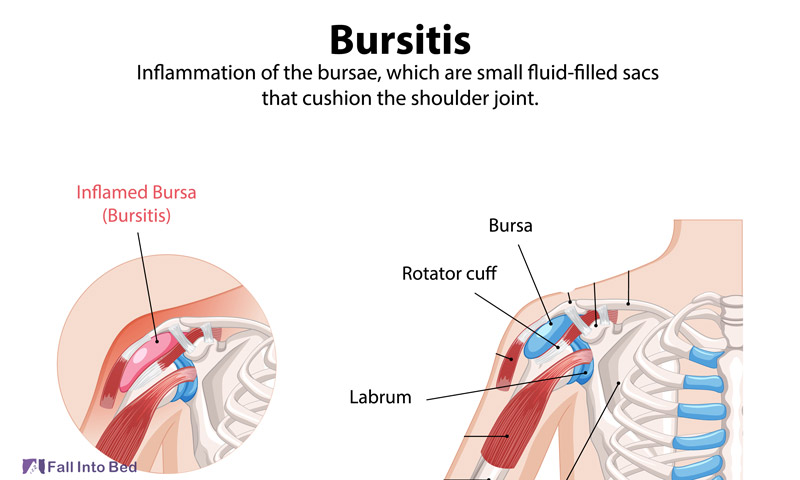Sleep is very important and it’s very frustrating when something keeps interrupting the process. Shoulder pain is one of those pains that can get annoyingly long if you don’t take action and find the reason. In this article we’re going over different reasons for shoulder pain while sleeping. So stay tuned.
Common causes of shoulder pain from sleeping
There are 5 common reason why you might be experiencing shoulder pain in your sleep:
1. Sleeping positions
The way you sleep can have a huge impact on whether you get a shoulder pain or not. Some sleeping positions are not the best when it comes to shoulder’s health; Especially with those with pre-existing joint issues.
Sleeping on your back with hands above head, or with one hand on the forehead can be bad position for your shoulders over time. While it might feel comfortable at first, this position can put strain on the shoulder muscles and joints, leading to stiffness or pain upon waking.
Also, if you have had any recent injuries regarding your shoulders, don’t sleeping on the same side as your injured shoulder. Let the area heal completely before you put any pressure on it, to avoid any chronic pain later on.
If you also have back pain, instead of the normal back sleeping you can also try sleeping on the uninjured side of your body. But you should make sure your mattress and pillows are standard.
Check out the differences between sleeping on the left and right side.
2. Shoulder impingement
Another reason why you might be experiencing shoulder pain during sleep is shoulder impingement. This conditions occurs when the top edge of your shoulder blade – your scapula- pinches the rotator cuff muscles.

3. Frozen shoulder
When the connective tissue and the capsule in your shoulder joint gets thickened and inflamed, it can negatively affect the motion in that limb. This condition is called frozen shoulder. Moving your shoulder up and down or to the sides can become painful. This condition has 3 stages:
- freezing (increasing pain and stiffness)
- frozen (limited motion but pain may decrease)
- thawing (gradual improvement in mobility).
Recovery can take months or even years if you don’t consult a doctor about the pain. Treatments can vary from physiotherapy and occupational therapy to surgery.
4. Rotator cuff injury
Rotator cuff muscles are 4 muscles that circle around your shoulder joint and stabilize the area and keep it secured. And a rotator cuff injury happens when one of the four muscles become inflamed or irritated and in some cases partially or totally torn apart.
No matter what the type of injury is, it can lead to shoulder pain during your sleep. So, it’s important to let a medical professional to check your shoulder before the damage is too much to repair.
5. Shoulder bursitis
Actually Shoulder bursitis is a type of shoulder impingement. And it happens when the bursa -which is one of the fluid-filled sacs in the joint – gets inflamed and swollen. The swelling in the area can lead to shoulder impingement.

How to ease or avoid shoulder pain from sleeping
Change your sleep position
Like we mentioned, sometimes the cause of your shoulder pain is the wrong sleeping positions. Avoid sleeping on your back with elevated shoulders, or sleeping on the injured side.
If you’ve recently broken your arm or shoulder and you don’t know how to sleep with the cast and the pain, check out our article.
Stretch before and after sleep
When it comes to avoiding shoulder pain, stretching before and after sleep can be a real game changer. Before you hit the sack, take a few minutes to loosen up those shoulders. Try simple stretches, like reaching your arm across your chest or doing a gentle doorway stretch.
Then in the morning, hit the reset button with a few more stretches. You know that feeling when your alarm goes off and your body acts like it’s been through a war? Yeah, that’s when a nice stretch can swoop in like a hero, saving your shoulders from that leftover stiffness.

Buy an ideal mattress
Most of the time, the reason why our shoulder won’t go away is because of a bad mattress. Ergonomic and standard mattresses are a mandatory equipment for sleep. Make sure your mattress has the criteria of a good one.
Try the RICE method
The RICE technique is a great way to manage your shoulder pain after an injury and start feeling better. It’s simple:
- Rest: Take it easy and avoid putting pressure on the injured area for at least 24-48 hours. Depending on how serious the injury is, you might need to rest for a few days. Gradually start doing your activities when you’re feeling better, but don’t rush!
- Ice: Grab some ice, wrap it in a cloth, and place it on the injury for about 15-20 minutes. Do this every 1-2 hours during the first 48 hours. It helps numb the pain and reduce swelling. Just don’t leave the ice on for too long at once.
- Compression: Use a bandage to wrap the injured area snugly for the first 24-48 hours. This helps control swelling and gives your injury some support. But don’t wrap it too tightly! If you feel throbbing or see swelling below the wrap, loosen it up.
- Elevation: Whenever you can, prop the injured part up so it’s higher than your heart, especially in the first 24-48 hours. This helps keep swelling down and speeds up recovery.
It’s an easy, go-to method for minor injuries, but if the pain sticks around or gets worse, it’s always a good idea to see a doctor.
FAQ about shoulder pain while sleeping
How can I tell if shoulder pain is serious?
Shoulder pain can sometimes be tricky to evaluate on your own, but there are a few signs that could suggest the pain is more serious and may need medical attention. Here’s what to look out for:
- Severe pain or inability to move your shoulder
- Swelling or bruising
- Deformity
- Pain lasting over a week
Can the Way You Sleep Cause Pain in Your Shoulders?
Yes, the way you sleep can definitely cause shoulder pain or make it worse. Certain positions, especially if you’re a side sleeper, can put pressure on your shoulders and lead to discomfort.








